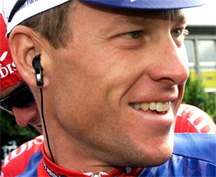(Reuters) – Seven-time Tour de France winner Lance Armstrong said yesterday he would no longer fight doping accusations by the U.S. Anti-Doping Agency, which said it would strip him of his titles and ban him from competitive cycling.

“There comes a point in every man’s life when he has to say, ‘Enough is enough,’“ Armstrong said in a statement posted on his website Lancearmstrong.com.
“For me, that time is now. I have been dealing with claims that I cheated and had an unfair advantage in winning my seven Tours since 1999,” he said.
USADA spokeswoman Annie Skinner said the agency would strip Armstrong of his seven titles and ban him for life from competitive cycling. In the statement, Armstrong did not concede having used performance enhancing substances during his celebrated cycling career. On the contrary, he said he would “jump at the chance” to put the allegations to rest.
But the 40-year-old Texan said he refused to participate in the USADA process, which he called “one-sided and unfair.”
He disputed the agency’s authority to take away his titles.
Armstrong has been one of the most successful and controversial cyclists of all time.
A cancer survivor, he returned to the sport after beating the illness and won the Tour de France an unprecedented seven times in succession from 1999 to 2005.
The Austin American-Statesman reported that Armstrong also alerted the USADA in a letter sent just before a midnight Thursday deadline that he would not fight the charges through arbitration.
“It is a sad day for all of us who love sport and our athletic heroes,” Travis Tygart, USADA’s chief executive officer, said in a written statement.
‘WIN-AT-ALL-COSTS-CULTURE’
“This is a heartbreaking example of how the win-at-all-costs culture of sport, if left unchecked, will overtake fair, safe and honest competition, but for clean athletes, it is a reassuring reminder that there is hope for future generations to compete on a level playing field without the use of performance-enhancing drugs,” he said.
The USADA, a quasi-governmental agency created by the U.S. Congress in 2000, formally charged Armstrong in June with doping and taking part in a conspiracy with members of his championship teams. Five other cyclists have been accused of conspiring with Armstrong over the course of 14 years to hide doping activity.
The agency said in a letter to Armstrong that it has blood samples from 2009 and 2010 that are “fully consistent” with doping.
In the letter, which was published in the Washington Post, the agency said it also has at least 10 former teammates and colleagues of Armstrong who will testify he used doping drugs during races from 1999 to 2005.
Lawyers for Armstrong contend the USADA gathered evidence by threatening to ruin the careers of fellow cyclists who have agreed to testify against him. Armstrong’s lawyers also argue that the agency’s rules violate his right to a fair trial and that it lacks proper jurisdiction to charge him.
In February, the Justice Department dropped an investigation centered on whether Armstrong and his teammates cheated the sponsor of their bike racing team, the U.S. Postal Service, with a secret doping program.
Armstrong’s attorneys contend that he has “passed every drug test ever administered to him in his career – a total of 500 to 600 tests… more drug tests than any athlete in history.”
They say the International Cycling Union has proper jurisdiction in the case.
